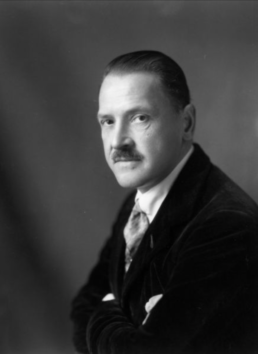These life stories may contain descriptions of childhood trauma and abuse, as well as images, voices and names of people now deceased. If you need help, you can find contact details for some relevant support services on our support page.
Popular English writer, W. Somerset Maugham (1874-1965), was in kinship care as a child.
William Somerset Maugham was born at the British embassy in Paris where his father, Robert Ormond Maugham, worked as a lawyer. William became an orphan when he was ten years old. First, his mother, Edith Mary, died of tuberculosis in 1882 and then his father died two years later of cancer.
Young William was sent to live in England with his paternal Uncle Henry MacDonald Maugham (1828-1897), and his Aunt Sophia, an unhappy experience for him. William did not speak English well and so was bullied by other children at King’s School, Canterbury.
He also grieved the loss of his parents, particularly his mother.
As soon as he could, William left home. He was sixteen when he went to Germany to study literature at Heidelberg University. On his return to London, he tried out accountancy and then medicine. During his training to become a medical doctor, Maugham published his first novel, Liza of Lambeth (1897).
As a medical student Maugham had seen first-hand the poor and suffering of the shabby working classes in London’s Lambeth slum area while apprenticing as a midwife. The experience would serve him well in writing vivid physical descriptions of his fictional characters, and in realistic portrayals of the seedier aspects of life and its consequences on the human psyche (Merriman).
When Liza of Lambeth became a commercial success, he gave up medicine—he had qualified by then to practice as a doctor—and became a writer full time. Fame came to him when he had four plays being performed in London at the same time during the 1920s.
Maugham served as a Red Cross ambulance driver during WWI before he was recruited by the British Secret Intelligence Service. He continued traveling widely after the war and used his experiences to write innovative travel books such as The Gentleman in the Parlour (1930).
During his almost eighty years of writing, Maugham wrote some of the 20th century’s most popular books, including Of Human Bondage (1915). His financial success was in part because of the many adaptations of his work into film and television and was such that he could afford a luxurious lifestyle on the French Riviera.
“The Villa Mauresque and Somerset Maugham, Somerset Maugham and the Villa Mauresque: for nearly forty years the two were inextricably linked, the house the richest thread in the fabric of the legend, visited, photographed, filmed, described in countless articles, regarded with awe as the glamorous and exotic backdrop for one of the most famous writers in the world” (Hastings).
The Somerset Maugham Award was established by Somerset Maugham in 1947 to encourage young writers to travel.
References:
Begley, Ann. “Grand Old Man of Letters: The life and writing of William Somerset Maugham”. America, vol. 204 (2010): 22f.
Hastings, Selina. The Secret Lives of Somerset Maugham: A Biography. New York: Arcade Publishing, 2012.
Merriman, C.D. “William Somerset Maugham”. The Literature Network, 2008. http://www.online-literature.com/Maugham
Rubin, Martin. “Read More Than Respected”. Wall Street Journal, 27 May 2010.
Image available here.
